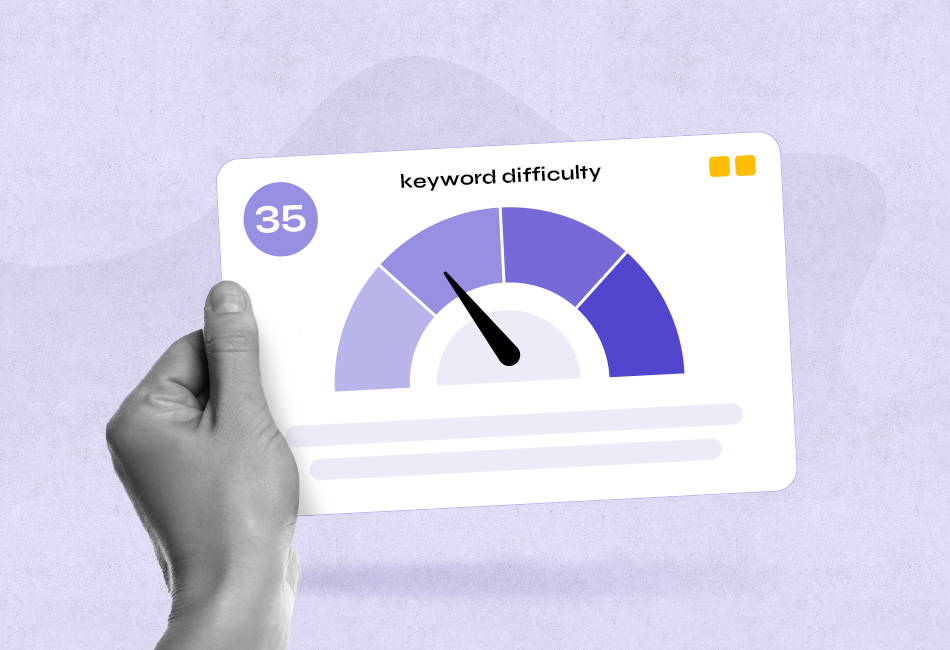Understanding keyword difficulty is a key part of SEO (Search Engine Optimization), and this guide makes it easy to learn all about it. We’ll show you what keyword difficulty is, why it’s important for your website’s ranking in search results, and how it affects your SEO strategy. You’ll learn about different difficulty levels and what makes some keywords harder to rank for than others. This guide is great for anyone who wants to get better at SEO, whether you’re just starting out or trying to improve what you’re already doing. By the end, you’ll know how to pick the right keywords to help your website succeed online.
What is Keyword Difficulty?
Keyword Difficulty (KD) is a score that tells you how hard it is to rank high in search engine results for a particular word or phrase. A higher score means it’s more challenging to rank for that keyword. This score considers how strong the competition is, the quality of content that’s already ranking, and how many good backlinks those pages have.
Understanding this score is important for a few reasons. First, it helps you plan better. If you know a keyword is tough to rank for, you might focus on easier ones, especially if your website is new or small.
Second, it sets realistic expectations. Knowing the difficulty score lets you understand how much work it’ll take to rank high and how long it might take to see results.
Lastly, it helps you decide which keywords to use in your content. By focusing on keywords that are easier to rank for, you can get more visitors to your site.
In short, Keyword Difficulty is a vital part of SEO. It helps you choose the right keywords to focus on, making your SEO efforts more effective.
Understanding Keyword Difficulty Score and Its Significance
The Keyword Difficulty Score (KDS) is a number that shows how hard it is to rank for specific keywords in search results. This score is shown as a percentage; different levels mean different things for your SEO strategy.
<30
Easy-to-Rank Keywords
These keywords are less competitive and easier to rank for. Good for new websites or those with limited SEO resources. Focus on these to get noticed and work up to tougher keywords later.
30 – 70
Medium Difficulty Keywords
These keywords are easier to rank for than highly competitive ones, yet still demand strong SEO. They present a balanced opportunity for websites with an established online presence.
>70
Hard-to-Rank Keywords
Keywords above 70% difficulty are tough to rank. Used by big websites, they have strong links and content. Success requires a solid SEO strategy with great topic content clusters and link-building.
Knowing the Keyword Difficulty Score helps you choose the right keywords for your website. It’s all about picking keywords that match how much SEO work you can do and how visible your site is. This way, you can improve your chances of getting higher up in search results and getting more people to visit your site.
Understanding What Influences Keyword Difficulty
Knowing what makes some keywords harder to rank for than others is essential for a good SEO strategy. There are a few main things that affect how difficult a keyword is:
Content quality
First and foremost, the quality of your content matters a lot. Search engines prefer informative, well-written content and thoroughly explore the topic. If the top-ranking pages for a keyword feature high-quality content, this means the keyword is more challenging to rank for.
Referring Domains
Next, consider backlinks and the domains they come from. A website with many backlinks from well-known, authoritative sites is seen as more trustworthy. Keywords are more challenging to rank for if the top content for those keywords has lots of these high-quality backlinks.
Domain Authority
Then there’s Domain Authority (DA). This score predicts how well a website might rank on search engines. Sites with a high DA are seen as more credible. If high-DA sites rank for a keyword, it usually means that it is more challenging for others to rank for.
Alignment with Search Intent
Lastly, how well content matches the searcher’s intent is crucial. This means understanding what people are looking for when they search for a specific keyword. Different search intentions exist, like looking for information or wanting to buy something. If the top content for a keyword matches this intent well, it’s easier to rank with content that does the same.
How to Pick the Best Keywords Using Difficulty Scores
Selecting the right keywords is essential to SEO success, and using Keyword Difficulty Scores (KDS) helps. Here’s a simple way to use these scores to find great keywords:
Use Keyword Difficulty Tools
First, use online tools to check the difficulty of keywords. These tools give each keyword a score that shows how hard it might be to rank for it. Type in the keywords and the tool will show you their scores. This score is based on how many good links the top pages have, how trusted those sites are, and how relevant the content is. Tools like SEMrush, Ahrefs, or Moz are great for this.
Look at Search Volume and Difficulty Together
Then, compare how often people search for the keyword (search volume) with how hard it is to rank for it (difficulty). You want to find keywords that many people search for but are relatively easy to rank for. Popular keywords are sometimes very competitive, so you must find a good balance.
Focus on Long-Tail Keywords
Lastly, think about using long-tail keywords. These are longer, more specific phrases and usually easier to rank for. They might be searched less often, but they can bring in more targeted traffic, which could mean more people who are likely to take action on your site. Plus, these keywords often have less competition.
Need help finding the right keywords?
At Huely Inc., we take pride in transforming your keyword selection process. Our expertise and advanced tools are designed to precisely analyze keyword difficulty, ensuring you pick the most effective options for your SEO strategy. We offer personalized guidance, understanding your unique business needs, and helping you navigate the competitive landscape of SEO. By partnering with us, you’ll benefit from our industry insights and stay ahead of the latest trends, optimizing your online presence. Let us drive your SEO success, leading to enhanced online results and a more robust digital footprint—Trust Huely Inc. to unlock the full potential of your website.






